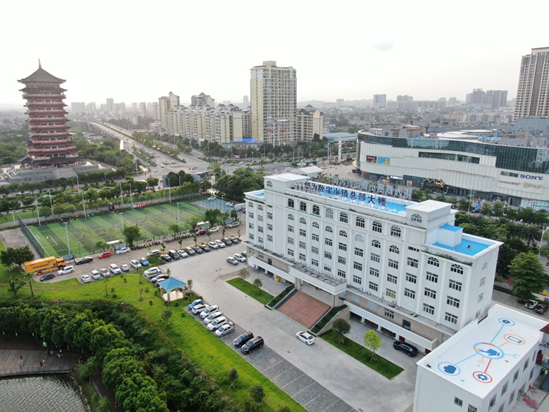

(Written by Li Min / Translated by Chen Zhiying)Data create value and innovation empowers the economy. Since we are in a digital age, the development of digital economy has become an important part on the agenda of all local governments. All parties are catching up with each other and hoping to move forward. Along the Beibu Gulf, digital economy is also been placed high hopes on. Some pioneers and latecomers make progress by taking advantage of digital economy. Qinzhou, positioned as the sub center of China-ASEAN Information Harbor in 2019, is the latecomer.
Taking advantage of the development of China-ASEAN Information Harbor sub center, Qinzhou has placed digital economy in a more important position. From cooperating with leading enterprises and attracting investment in line with industrial chains, to connecting relevant departments to promote its advantages and innovating investment promotion forms under the epidemic to realize new breakthroughs in cooperation, Qinzhou can be said to have broke through many difficulties and made great progress in digital economy. This not only brings more like-minded partners to the urban construction of this city, but also provides some new ideas for attracting investment and pushing the development of Guangxi Beibu Gulf Economic Zone.

New positioning and new target
In the development of digital economy of Qinzhou, there are several important time nodes:
In 2015, Qinzhou was approved as the third batch of pilot smart cities in China, boosting the rapid development of its big data. In 2016, Huawei settled its global public cloud node in Qinzhou, which was the only one in Guangxi. Two years later, Huawei authorized Qinzhou municipal government to use its name and trademark to name a big data industrial base. It was the first time that Huawei did so outside its system in the world.
In 2019, Qinzhou’s digital economy has ushered in an era of rapid development. In February, the Master Plan for the Construction of China-ASEAN Information Harbor was officially approved by the state, and Qinzhou was positioned as the sub center of China-ASEAN Information Harbor. In May, Huawei Digital Town in Qinzhou was officially launched, serving as the core area of China-ASEAN Information Harbor sub center.
China-ASEAN Information Harbor jointly constructed by China and ASEAN, aims to build platforms on infrastructure, technical cooperation, economic and trade services, information sharing and people-to-people exchanges for both sides, so as to promote multilateral cooperation in the region. Qinzhou actively building itself into the China-ASEAN Information Harbor sub center will undoubtedly help to cultivate local digital economy related industries, drive the development of a number of characteristic parks and projects, and promote the high-level opening and high-quality development of Qinzhou. Therefore, Qinzhou will play a more important role in China-ASEAN cooperation, laying a solid foundation for building itself into a hub city for the new western land-sea corridor of the Belt and Road.

With the new positioning of China-ASEAN Information Harbor sub center, Qinzhou also has a new goal in developing digital economy: It is estimated that by 2022, there will be 800 digital economy related enterprises settled in Qinzhou. A national big data scientific and technological innovation platform, more than five industrial public platforms, more than five high-end industrial clusters of digital economy, and a green environmental ecosystem of ten thousand mu with thousands of digital artisans will be formed, driving the output value of the digital information industry to exceed RMB 100 billion yuan. At that time, Qinzhou will become an international technology transfer center, an industrial cooperation center, a trade cooperation center and a port logistics center.
The goal is not far away. Qinzhou can reach it with hard work, among which the most important thing is to actively attract investment.
Attracting investment for Qinzhou’ digital economy
As an emerging field in Qinzhou, digital economy faces many difficulties, such as the challenges of how to make up industrial chains, how to make the industrial parks alive, how to form scale effects, etc. All this can be summed up as the challenges in attracting investment.
The most difficult thing for attracting investment is that we don’t know where to go and who to look for. Combining with the development of the national big data industry and local realities, Qinzhou took the lead in compiling the big data industry tree in Guangxi, thus making clear the overall condition and the development goal of the big data industry, the upstream and downstream industrial chains, and the investment promotion direction. It targeted 200 enterprises in different regions, fields and industries, and then carried out precise investment promotion. Together with Huawei, Qinzhou carried out investment promotion with a focus on Huawei’s industrial chains and partners, further improving the accuracy of the investment promotion.
With targeted enterprises, Qinzhou took the initiative to go out to seize opportunities. From March 2019, through resource integration, Qinzhou organized a “Big Data Industry Investment Promotion Month” to carry out special investment promotion in Shenzhen, Beijing and other places, and jointly held investment promotion conferences with Huawei, China Mobile, China Unicom, China Telecom, and Urban and Small Town Reform and Development Centers of the National Development and Reform Commission. At the “Digital Qinzhou • Big Data Industry Promotion Conference” held in Hangzhou on March 27, 2019, Qinzhou signed nine new big data related enterprises and connected more than 50 enterprises who have the intention to cooperate.

However, the epidemic in 2020 has led to the stagnation of investment in many places. How to turn the crisis into an opportunity? Qinzhou innovated its thinking and continuously carried out online investment promotion featuring “online meeting”, “online connection” and “screen to screen” through 5G “cloud promotion”, “cloud contract signing”, “cloud investigation” and “cloud live broadcast”. Since 2020, Qinzhou has held five “cloud promotion conferences” and 24 projects have been signed online. The annual business income exceeded RMB 5 billion yuan. According to preliminary statistics, at present, economic projects of 21 platforms have been settled in Qinzhou Port Area of China (Guangxi) Pilot Free Trade Zone through “cloud investment promotion”. Qinzhou has also built the first 5G cloud investment promotion center integrating cloud promotion, cloud contract signing, cloud live broadcast, cloud investigation and cloud negotiation in Guangxi, serving as a platform for Qinzhou’s investment promotion featuring “online meeting”.
Now, entering the Baishi Lake Area in Qinzhou Binhai New City, we can see Huawei Digital Town designed according to the idea of Qi Baishi’s ink landscape painting, is built along the lake. Taking a bird’s eye view, we can enjoy the beauty of the city integrating with the culture of calligraphy and painting, beautiful and fascinating. Qinzhou takes out high-quality resources of the core area in the main urban area to build the digital town. The total construction area of the Phase I of the digital town is about 80,000 square meters, demonstrating the sincerity of Qinzhou. In return, good hardware support here will provide guarantee for Qinzhou to attract investment for digital economy.
In addition, combining with the development of national big data industries and local realities, Qinzhou has also taken the lead in introducing interim measures to promote the development of big data industry in Guangxi and put forward preferential measures in many aspects, such as office spaces, contribution rewards, operation subsidies, innovation awards and talent awards.
On this basis, Huawei Digital Town in Qinzhou, since its launch, has attracted more than 80 enterprises to settle in and more than 50 enterprises who are intending to sign contracts, which greatly enriches the team for the development of Qinzhou’s digital economy.
Qinzhou will take advantage of the situation and make more efforts. In detail, facing the good momentum of digital economy, Qinzhou will focus on the development of “digital Qinzhou” and China-ASEAN Information Harbor sub center, to vigorously develop digital economy, including strengthening digital infrastructure; greatly promote the integrated and innovative digital economy, with a focus on artificial intelligence, Beidou navigation satellite system, cross-border E-commerce, etc.; create a collaborative and efficient digital government; and develop a digital society which is convenient for the public, such as applying the digitization to government affairs, transportation, medical treatment, education, etc. With these development goals, Qinzhou’ digital economy will undoubtedly have a clearer direction and focus, and a more powerful driving force.
Source: China-ASEAN Panorama
桂ICP备14000177号 Copyright@2006-2013 Guangxi China-ASEAN Panorama Magazine Agency Co., Ltd. All Rights Reserved